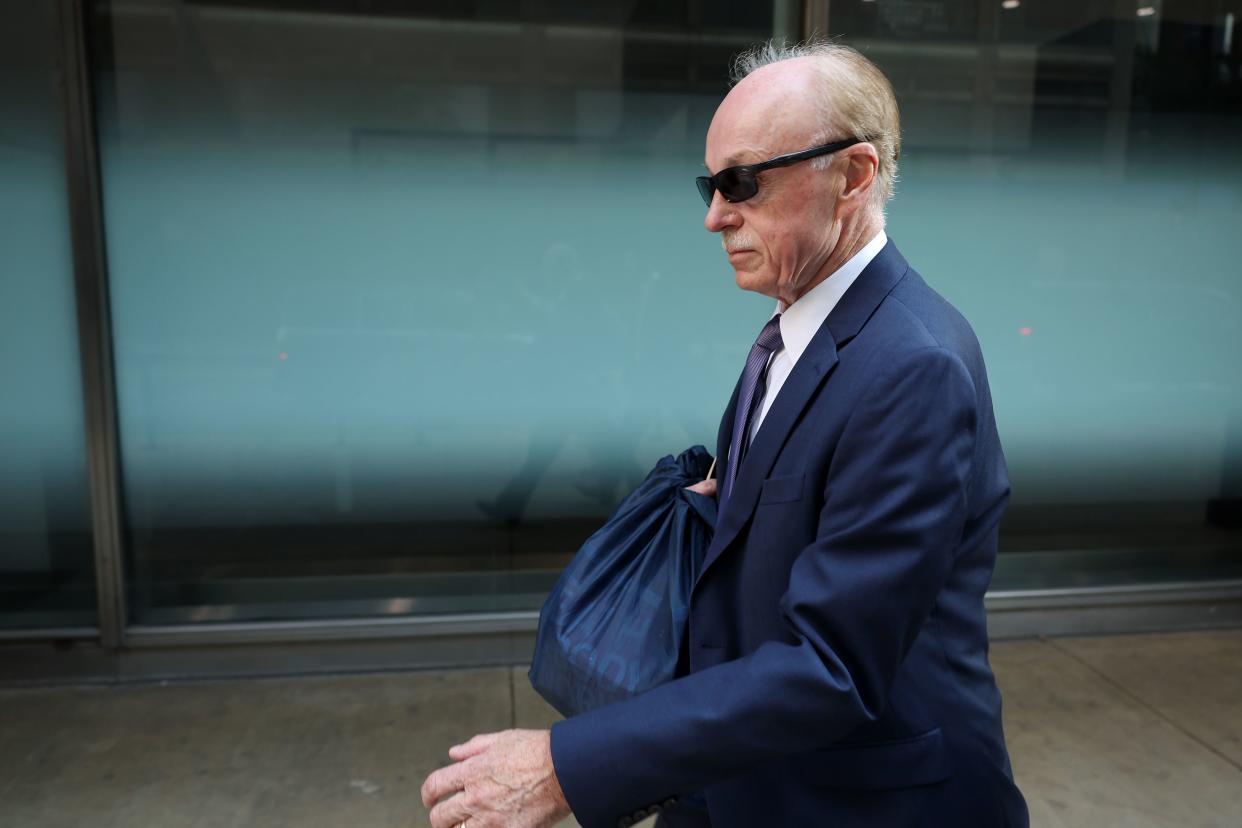Longtime Democratic insider Tim Mapes guilty in Illinois perjury trial

CHICAGO — Longtime Democratic insider Tim Mapes was found guilty Thursday on perjury and obstruction of justice charges alleging he lied to a federal grand jury in an attempt to protect his longtime boss, former House Speaker Michael Madigan.
The jury of six men and six women deliberated for about xxx hours before delivering the verdict in U.S. District Judge John Kness’ courtroom.
Mapes, 68, of Springfield, faces up to 20 years in prison on the attempted obstruction count, while perjury calls for a maximum of five years behind bars.
The decision marked the conclusion of a nearly three-week criminal case that centered on relatively straightforward charges yet delved deeply into the behind-the-scenes political intrigue of the scandals that rocked Madigan’s office and ended his decadeslong grip on power.
Mapes is also the second member of Madigan’s inner circle to be convicted by a jury in the past several months, delivering yet another blow to Madigan as his own wide-ranging federal racketeering trial looms next year.
In May, Madigan’s longtime confidant, Michael McClain, was found guilty along with three others in a bribery conspiracy to funnel payments from Commonwealth Edison to Madigan associates in exchange for the speaker’s influence over the utility’s legislative agenda in Springfield.
Madigan and McClain are co-defendants in next year’s trial, set to begin April 1. But they both played major roles in the government’s case against Mapes, who served as Madigan’s chief of staff, House clerk and executive director of the Madigan-run state Democratic Party until he was unceremoniously ousted in a 2018 #MeToo scandal.
Madigan, McClain and Mapes were described as the three major players in a triangle of power that held sway over the longtime speaker’s Democratic House caucus, government operations and major grip on statewide politics.
One of the more memorable moments in the trial came when Democratic Rep. Bob Rita of Blue Island used his hands to draw a triangle as he told jurors that Madigan sat at the apex and that McClain and Mapes occupied the two remaining corners.
That rough organizational chart was well known in Springfield, as it held sway over the flow of legislation in the House and the Democratic politics designed to keep Madigan speaker--a post he held for a national record 36 years.
Mapes faced a single count of perjury based on seven alleged lies outlined in his indictment and a single count of attempted obstruction of justice based on numerous statements allegedly designed to impede the grand jury investigation into the Madigan-McClain case.
The obstruction count carries a maximum potential sentence of 20 years in prison while perjury could put Mapes behind bars for as long as five years.
The panel sent out only two notes during the deliberations Thursday, asking for a copies of the grand jury transcript of Mapes’ questioning as well as the indictment. The judge promised to send a hard copies back to the jury room.
Mapes, 68, of Springfield, is charged with perjury and attempted obstruction of justice in an indictment accusing him of repeatedly lying during his appearance before the grand jury investigating Madigan and his vaunted political operation.
He faces up to 20 years in prison on the obstruction count, while the perjury charges carry up to five years behind bars.
Though the charges are fairly straightforward, the trial has been filled with political intrigue surrounding the decline of Madigan’s decades-long grip on power, including testimony about the #MeToo-era sexual harassment scandal that consumed the speaker’s office and led to Mapes’ abrupt ouster in June 2018.
In her closing argument Wednesday, Assistant U.S. Attorney Julia Schwartz told the jury that Mapes, who had served as Madigan’s chief of staff for more than 25 years, was an insider “who was behind the curtain” of Madigan’s often-secretive political organization, and could have given the grand jury key insight when he testified under a grant of immunity on March 31, 2021.
Many of the allegedly misleading statements had to do with Mapes’ failure to recollect anything about Madigan’s relationship with longtime confidant Michael McClain, and whether Madigan continued to give McClain political “assignments” after McClain’s retirement from lobbying in 2016, according to prosecutors.
“If the defendant had been honest, he would have been a star witness,” Schwartz said. “But he did everything he could to obstruct the process … to minimize his participation, to act as if he was clueless.”
Mapes’ attorney, Andrew Porter, blasted those allegations in his closing argument, saying Mapes did his “level best” to provide truthful answers. He also accused prosecutors of asking open-ended questions and failing to provide Mapes with any corroborating materials that might refresh his recollection of years-old conversations..
Saying Mapes could have been a star witness “assumes, without evidence, assumes that Tim Mapes knew whether Madigan and McClain were discussing these topics,” Porter said. “And he didn’t. ... He couldn’t remember what he didn’t know.”
Porter also said Mapes had no motive to lie, particularly since Madigan had forced his resignation over harassment and bullying allegations that Mapes had denied.
“The government throws out (it was to) ‘protect the boss’. ... Why would he fall on his sword for a guy who kicked him to the curb three years before?” Porter asked the jury.
Over eight days of testimony, prosecutors presented 14 witnesses and dozens of wiretapped phone conversations, emails and other documents in an effort to prove that Mapes was lying.
The prosecution’s case also included the audio of Mapes’ entire grand jury testimony, offering a rare glimpse into a secretive process and illuminating how big-time political corruption investigations play out behind the scenes.
Mapes, who in addition to being Madigan’s chief of staff also served stints as executive director of the state Democratic Party and the clerk of the House, chose not to testify in his own defense.
____

